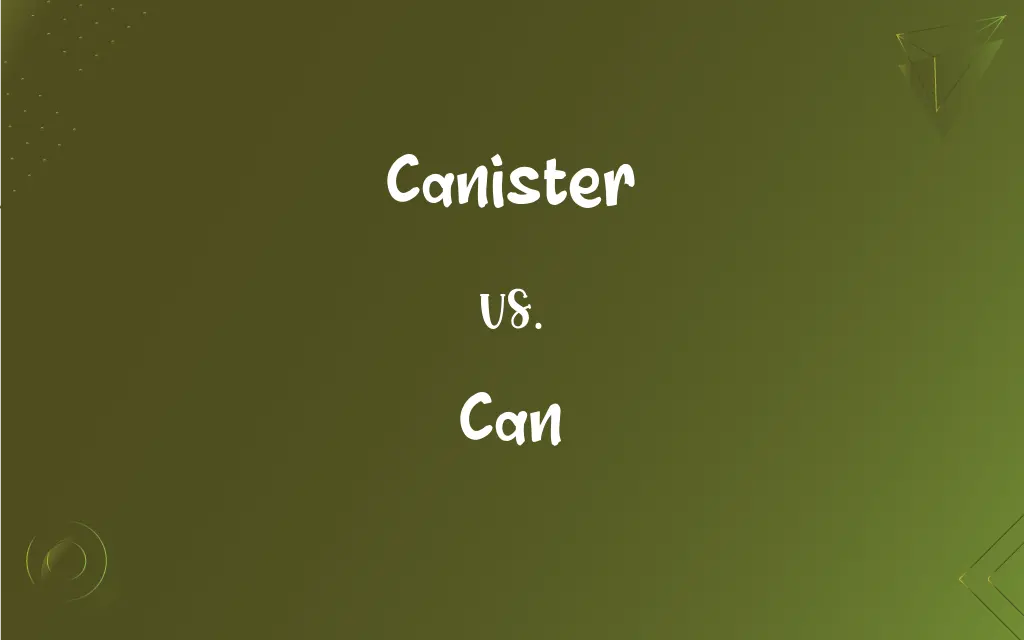Canister vs. Can: What's the Difference?
Edited by Aimie Carlson || By Janet White || Updated on July 7, 2024
A canister is a small box or container, often with a lid, while a can is typically a cylindrical metal container used for preserving food.

Key Differences
The word "canister" generally denotes a small, often cylindrical, box or container, possibly with a lid, used to hold a variety of items, such as tea, coffee, or sugar. It can be made from various materials including metal, plastic, or glass. A canister is not limited to the kitchen; it can also hold film, gas, or other items depending on its design and construction. It’s characterized by its utility in storing and preserving different kinds of items securely. In contrast, "can" typically refers to a sealed, metal container used primarily for preserving and storing food. It is a ubiquitous item in kitchens and supermarkets, holding a range of food products from vegetables to meats.
"Canister" conveys more versatility in terms of use and material; it’s more about containment and storage, reflecting its function in holding items securely, whether they are perishable or non-perishable. The choice of a canister can be based on aesthetic preferences, and its design can be decorative and stylish, catering to different tastes and decors. This decorative aspect makes canisters suitable for display in various settings, not just for storage.
Conversely, "can" implies practicality and functionality, prioritizing preservation over aesthetics. Its design is usually straightforward, focusing on durability and preservation. While the design of a can is largely standardized, its labeling and branding will vary, serving to inform the consumer about the contents. This practical approach ensures that cans are efficient in fulfilling their primary role of containing and preserving food.
The defining difference between a canister and a can lies in their purpose, material, and aesthetic value. A canister, with its diverse materials and designs, is versatile, used for storing a variety of items and often chosen with aesthetics in mind. On the other hand, a can, typically made of metal, is utilitarian and primarily used for preserving food, emphasizing durability and practicality over decorative appeal.
Comparison Chart
Material
Can be made of metal, plastic, glass, etc.
Typically made of metal
ADVERTISEMENT
Use
Used to store a variety of items
Primarily used to preserve food
Aesthetics
Can have decorative designs and can be chosen for aesthetics
Standardized and utilitarian design
Contents
Can hold perishable or non-perishable items
Holds perishable food products
Purpose
More about containment and storage
More about preservation
Canister and Can Definitions
Canister
A container used for dispensing gas.
The mountaineer carried an oxygen canister with him.
ADVERTISEMENT
Can
A cylindrical metal container used for preserving food.
She opened a can of green beans for dinner.
Canister
A cylindrical container for holding or storing items.
She placed the cookies in a decorative canister.
Can
A receptacle for discarding waste.
Please throw the trash in the can.
Canister
A container often equipped with a lid used for storing small items.
He kept his collection of rare coins in a small metal canister.
Can
A prison or jail.
The criminal was sent to the can for five years.
Canister
A cartridge containing gas or film.
The photographer loaded a new canister of film into the camera.
Can
A usually cylindrical metal container.
Canister
A box or can of thin metal or plastic used for holding dry foodstuffs or cooking ingredients, such as flour or sugar.
Can
An airtight container, usually made of tin-coated iron, in which foods or beverages are preserved.
Canister
A small plastic container used for storing a roll of film.
Can
The contents of such a container
Ate a can of beans.
Canister
A metal container that holds pressurized gas, as one containing tear gas that explodes on impact or one containing oxygen as part of a breathing apparatus.
Can
(Slang) A jail or prison.
Canister
A metallic cylinder packed with shot that scatter upon discharge from a cannon, formerly used as an antipersonnel round.
Can
(Slang) A toilet or restroom.
Canister
Such cylinders, or the shot used in such cylinders, considered as a group.
Can
(Slang) The buttocks.
Canister
The part of a gas mask that contains the filter for removing toxic agents from the air.
Can
(Slang) A naval destroyer.
Canister
A cylindrical or rectangular container usually of lightweight metal, plastic, or laminated pasteboard used for holding a dry product (as tea, crackers, flour, matches).
Can
To seal in an airtight container for future use; preserve
Canning peaches.
Canister
Any of various cylindrical metal receptacles usually with a removable close-fitting top.
Can
(Slang) To make a recording of
Can the audience's applause for a TV comedy show.
Canister
A special short-range antipersonnel projectile consisting of a casing of light metal, loaded with preformed submissiles such as flechettes or steel balls. The casing is designed to open just beyond the muzzle of the weapon, dispersing the submissiles.
Can
To end the employment of; fire.
Canister
A projectile component containing colored or screening smoke or riot control agent composition.
Can
To put an end or stop to
Canned the TV show after one season.
Told the students to can the chatter.
Canister
A component of canister-type protective masks containing a mechanical filter and chemical filling to filter, neutralize and/or absorb toxic chemical, biological and radiological agents.
Can
To solicit cash donations for a charity or other organization such as a club or amateur sports team by holding out a can or other container in a public place.
Canister
Part of a windmill that connects the sails to the windshaft.
Can
To know how to; to be able to.
She can speak English, French, and German.
I can play football.
Can you remember your fifth birthday?
Canister
(transitive) To pack into a canister.
Can
May; to be permitted or enabled to.
You can go outside and play when you're finished with your homework.
Can I use your pen?
Canister
A small basket of rushes, reeds, or willow twigs, etc.
Can
(modal auxiliary verb, defective) To have the potential to; be possible.
Can it be Friday already?
Teenagers can really try their parents' patience.
Animals can experience emotions.
Canister
A small box or case for holding tea, coffee, etc.
Can
Used with verbs of perception.
Can you hear that?.
I can feel the baby moving inside me.
Canister
A kind of case shot for cannon, in which a number of lead or iron balls in layers are inclosed in a case fitting the gun; - called also canister shot.
Can
To know.
Canister
A metallic cylinder packed with shot and used as ammunition in a firearm
Can
To seal in a can.
They canned air to sell as a novelty to tourists.
Canister
Metal container for storing dry foods such as tea or flour
Can
To preserve by heating and sealing in a jar or can.
They spent August canning fruit and vegetables.
Canister
A protective case or housing.
The firefighters used canisters to protect their respiratory equipment.
Can
To discard, scrap or terminate (an idea, project, etc.).
He canned the whole project because he thought it would fail.
Can
To shut up.
Can your gob.
Can
To fire or dismiss an employee.
The boss canned him for speaking out.
Can
To hole the ball.
Can
(transitive) To cover (the fuel element in a nuclear reactor) with a protective cover.
Can
A more or less cylindrical vessel for liquids, usually of steel or aluminium, but sometimes of plastic, and with a carrying handle over the top.
Can
A container used to carry and dispense water for plants (a watering can).
Can
A tin-plate canister, often cylindrical, for preserved foods such as fruit, meat, or fish.
Can
A chamber pot, now a toilet or lavatory.
Shit or get off the can.
Bob's in the can. You can wait a few minutes or just leave it with me.
Can
Buttocks.
Can
(slang) Jail or prison.
Bob's in the can. He won't be back for a few years.
Can
Headphones.
Can
(archaic) A drinking cup.
Can
(nautical) A cube-shaped buoy or marker used to denote a port-side lateral mark
Can
A chimney pot.
Can
An E-meter used in Scientology auditing.
Can
An ounce (or sometimes, two ounces) of marijuana.
Can
A protective cover for the fuel element in a nuclear reactor.
Can
An obs. form of began, imp. & p. p. of Begin, sometimes used in old poetry. [See Gan.]
With gentle words he can faile gree.
Can
A drinking cup; a vessel for holding liquids.
Fill the cup and fill can,Have a rouse before the morn.
Can
A vessel or case of tinned iron or of sheet metal, of various forms, but usually cylindrical; as, a can of tomatoes; an oil can; a milk can.
Can
To preserve by putting in sealed cans
Can
To know; to understand.
I can rimes of Rodin Hood.
I can no Latin, quod she.
Let the priest in surplice white,That defunctive music can.
Can
To be able to do; to have power or influence.
The will of Him who all things can.
For what, alas, can these my single arms?
Mæcænas and Agrippa, who can most with Cæsar.
Can
To be able; - followed by an infinitive without to; as, I can go, but do not wish to.
Yet he could not but acknowledge to himself that there was something calculated to impress awe, . . . in the sudden appearances and vanishings . . . of the masque
Tom felt that this was a rebuff for him, and could not but understand it as a left-handed hit at his employer.
Can
Airtight sealed metal container for food or drink or paint etc.
Can
The quantity contained in a can
Can
A buoy with a round bottom and conical top
Can
The fleshy part of the human body that you sit on;
He deserves a good kick in the butt
Are you going to sit on your fanny and do nothing?
Can
A plumbing fixture for defecation and urination
Can
A room equipped with toilet facilities
Can
Preserve in a can or tin;
Tinned foods are not very tasty
Can
Terminate the employment of;
The boss fired his secretary today
The company terminated 25% of its workers
Can
The toilet or bathroom.
He excused himself to go to the can.
Can
A container for holding or carrying liquids.
He filled up the gas can at the station.
FAQs
Can canisters be decorative?
Yes, canisters can be decorative and come in various designs.
Can a canister be made of glass?
Yes, canisters can be made of glass, metal, plastic, etc.
Can a can be used as a general term for a container?
Yes, "can" can refer to various containers, including trash cans.
Is a canister usually equipped with a lid?
Often, canisters come with lids to secure the contents.
Are canisters used to store perishable items?
Canisters can store perishable items like food, but also non-perishable items.
Can a canister hold non-food items?
Yes, canisters can hold a variety of items, including non-food items like coins or film.
Is a can typically used for food preservation?
Yes, cans are typically used to preserve food.
Can a can be made of materials other than metal?
While typically metal, cans can also be made of sturdy materials like plastic.
Can canisters be transparent?
Yes, canisters, especially those made of glass or plastic, can be transparent.
Can canisters come in different shapes?
Yes, while often cylindrical, canisters can come in various shapes.
Is a can typically cylindrical?
Yes, a can is typically a cylindrical metal container.
Are cans recyclable?
Yes, metal cans are usually recyclable.
Do cans have a long shelf life?
Yes, cans are designed to have a long shelf life for food preservation.
Are cans sealed airtight?
Yes, cans are sealed airtight to preserve the freshness of the contents.
Do canisters often have decorative appeal?
Yes, many canisters are designed with decorative appeal in mind.
About Author
Written by
Janet WhiteJanet White has been an esteemed writer and blogger for Difference Wiki. Holding a Master's degree in Science and Medical Journalism from the prestigious Boston University, she has consistently demonstrated her expertise and passion for her field. When she's not immersed in her work, Janet relishes her time exercising, delving into a good book, and cherishing moments with friends and family.
Edited by
Aimie CarlsonAimie Carlson, holding a master's degree in English literature, is a fervent English language enthusiast. She lends her writing talents to Difference Wiki, a prominent website that specializes in comparisons, offering readers insightful analyses that both captivate and inform.































































